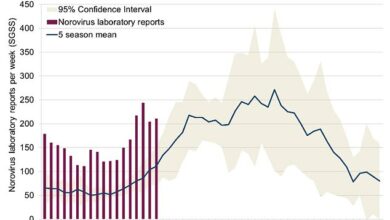CDC warns Wyoming man contracts distemper that causes organ failure


A man in Wyoming has contracted a rare disease spread through dog urine, prompting a CDC investigation.
The anonymous man sought medical attention after passing out and experiencing unexplained fever, nausea, sweating and body aches for several days.
A few days later the patient returned to the hospital. Tests showed that he had fluid around his lungs and that his kidneys were damaged.
After a series of tests and learning experiences working closely with animals, he was diagnosed with leptospirosis, a disease that kills one in six patients.

Leptospirosis is transmitted to humans through contact with contaminated urine from animals such as dogs, rats and cattle.
The CDC and the Wyoming Department of Health suspect the man became infected through his work, which included exposure to three dogs that mysteriously died.
The investigation also found that there was an outbreak among dogs in Wyoming at the time, with 13 dogs testing positive for the disease and four dying from severe illness.
This is believed to be the first human case of leptospirosis in Wyoming in 30 years.
Doctors struggled to diagnose the patient correctly because leptospirosis tends to spread in areas with high rainfall and waterlogged soil, making the disease more common in Appalachian states, the northern Midwest and parts of Texas.
The Wyoming man was treated with antibiotics and was allowed to go home a few days later.
The experts warned that dogs should be vaccinated against leptospirosis. Laboratory tests can determine whether dogs have antibodies to the disease, which indicates vaccination.
‘Lifestyle factors that increase dogs’ risk of exposure include contact with livestock or wild animals, time spent in kennels, and participation in activities that expose them to standing water or mud, such as roaming on farmland, hunting, hiking, or swimming,’ they wrote.
And all vets and boarding facilities must clean their waste properly to prevent the spread of infection.
Leptospirosis is caused by the bacterium Leptospira. This bacterium is found worldwide in soil and water, but is most common in subtropical areas with high rainfall, such as Australia, Africa, Southeast Asia and Central and South America.
When animals such as rats, dogs, or cattle are infected with leptospirosis, they may not show any symptoms of the disease.
But they can continue to shed the bacteria into the environment continuously or intermittently for a few months to several years.
People can become infected through contact with urine from infected animals.
The Wyoming patient said he was “professionally involved with dogs,” but it is unclear what exactly his work entailed.
“The patient was unrelated to any known canine case but was exposed to bodily fluids from multiple dogs during his work, including three that died of unknown causes,” experts wrote in a CDC report.
The same day the man began experiencing symptoms, three dogs at a local veterinary clinic were diagnosed with leptospirosis. A statewide analysis then found that 13 cases were reported between August and October 2023.
Veterinary records and interviews with staff members revealed that the sick dogs suffered from vomiting, lethargy and decreased appetite.
They also had low blood urea nitrogen and low serum creatinine, indicating kidney damage.
Four of the dogs were euthanized or died of serious illness. Five were attached to the same kennel from August to September, but officials did not name the operation.
Leptospirosis infections are uncommon in the U.S., with only 100 to 150 cases diagnosed each year. Of those, about 15 percent, or one in six, are fatal.
If left untreated, leptospirosis can lead to kidney failure, meningitis, liver damage, and breathing problems.
There are no vaccines available for humans, although there is a two-shot vaccine for dogs. CDC experts said the vaccine is generally recommended only for dogs living in high-risk areas such as Appalachia, the upper Midwest and central Texas.
However, the team said veterinarians are now moving to vaccinate all dogs.
The Wyoming patient was treated with oral antibiotics and released from the hospital.




